In November 2007, we listed and reviewed 10 promising Semantic Web apps. A lot can happen in one year on the Internet, so we thought we’d check back in with each of the 10 products and see how they’re progressing. What’s changed over the past year and what are these companies working on now? The products are, in no particular order: Freebase, Powerset, Twine, AdaptiveBlue, Hakia, Talis, TrueKnowledge, TripIt, Calais (was ClearForest), Spock.
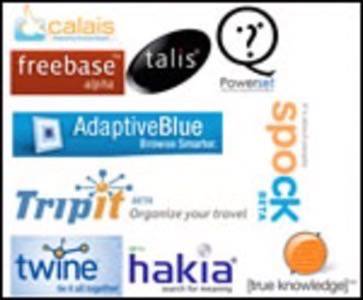
In our next post in this series, we’re going to publish a completely new list of Semantic apps to watch! That’s right, 10 more Semantic apps. Let us know your suggestions in the comments.
Freebase
Freebase is an open, semantically marked up database of information. It looks similar to Wikipedia, but Freebase is all about structured data and what you can do with it.

Freebase has been one of the more hyped companies in Semantic Web, leading to some skepticism that the product is too much like Wikipedia and offers nothing much new. In May ’08, we attempted to dispel the Freebase skepticism. Our conclusion was that the structured database, API, creative commons licensing – among other things – all added up to a richer product than Wikipedia. Then in July, we reported that Freebase was about to hit 4 million topics in its collection – which at the time was 60% more than the English Wikipedia.
However, we noted some concerns with Freebase – “big gaps in the data” along with usability issues. In a follow-up article in August, we covered an interesting tool for browsing Freebase, called Freebase Parallax. Unfortunately, when we tried out a number of searches in Parallax, very few subjects were well populated.
RWW verdict one year later: still lots of work to do for Freebase, in terms of usability and useful data.
Calais (was ClearForest)
When we did our round-up one year ago, ClearForest had been recently acquired by Reuters and at that point it had a Web Service and a Firefox extension. What a change a year brings! ClearForest went on to release Calais, a toolkit of products that enable users to incorporate semantic functionality within their blog, content management system, website or application.

Since launching the Open Calais API early this year, over 6,000 developers have registered with it and the service is doing more than 1 million transactions a day. We wrote about the launch of Calais’ easiest-to-use service yet, called SemanticProxy, at the end of September. Version 3.0 was released earlier this month and version 4 is expected by January 09.
RWW verdict one year later: Calais has really blossomed over the past year and it is one of the most promising Semantic services around today. We can’t wait to see what’s next!
Powerset
Powerset (see our initial coverage here and here) is a natural language search engine. It’s fair to say that Powerset has had a great 2008, having been acquired by Microsoft in July this year.

At the time of the acquisition, Powerset said that it needed a bigger partner to expand its product beyond its current state of only searching Wikipedia – something we had speculated about when the rumors of the acquisition first appeared. In its own statement, Microsoft stressed how useful Powerset’s technology will be for improving Microsoft’s own search products and to “take Search to the next level.” In our analysis of the deal, we noted that it was a “bold play requiring exact execution” by Microsoft. We thought it was doubtful that Microsoft bought the company just to enhance Live Search – although in September Microsoft did just that. Possibly the plan is to replicate the Wikipedia solution, then incorporate Powerset into Internet Explorer.
RWW verdict one year later: successful acquisition for Powerset, bold one for the acquirer Microsoft. Can’t wait to see what Microsoft does with it!
Twine
Definitely one of the more controversial of the Semantic apps we’ve covered on ReadWriteWeb. At launch last year, Twine claimed to be the first mainstream Semantic Web app. The company’s founder Nova Spivack hasn’t been shy to talk the product up even more over the past year. Version 1.0 of Twine was launched late October. At that time Spivack told us that Twine had 500,000 unique visitors in its closed beta, of which 50,000 are currently “active” (a user who visits the Twine site at least once per month). There were 20,000 ‘twines’ at that point, with 1 million pieces of content having been added to the system.
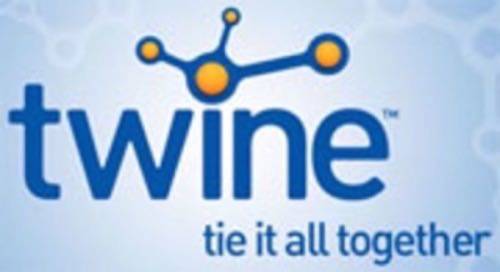
Those statistics are OK for a relatively young beta, however Twine has also been beset by usability and performance issues in its beta period. In March we summed it up with a post entitled: Twine Disappoints After Semantic Web Hype.
RWW verdict one year later: still far from mainstream and reviews have been disappointing user experience has been an issue over the past year. Struggling to find its niche.
Update: Some people have pointed out in comments and via email that many reviews of Twine have been positive. We agree and so we’ve struck out that line and clarified our position – that user experience has been the main issue.
Hakia
Hakia is a search engine focusing on natural
language processing methods to try and deliver ‘meaningful’ search results. Hakia attempts to
analyze the concept of a search query, in particular by doing sentence
analysis. Over the past year Hakia has been busy extending its reach – licensing its proprietary OntoSem technology to other companies in March and announcing a Semantic API in June. It also released a social network of sorts, called h-Club.
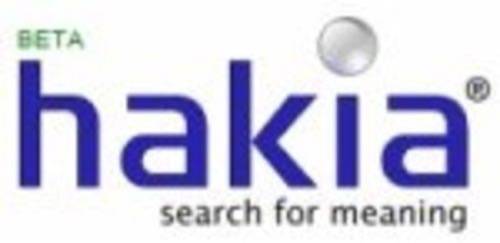
RWW verdict one year later: Hakia has made good progress getting its technology into the hands of third parties. It’s a steep challenge taking on Google though.
TripIt
Tripit is an app that manages your travel planning. With TripIt, you forward incoming bookings to [email protected] and the system manages the rest.

Over the past year TripIt has continued to iterate on its feature set – introducing LinkedIn integration, better mobile functionality, more social networking features, and other goodies.
RWW verdict one year later: TripIt is one of those apps that amazes people when they first use it. Its challenge now is to grab a foothold among mainstream users.
AdaptiveBlue
Disclosure: AdaptiveBlue is a current RWW sponsor and its founder Alex Iskold is a feature writer at RWW.
AdaptiveBlue are makers of the Firefox plugin, BlueOrganizer. As we wrote in January this year, the basic idea behind BlueOrganizer is that it gives you added information about webpages you visit and offers useful links based on the subject matter.

Over the past year the company has been working on a new product, called Glue. Launched last month, Glue is a more social networking oriented version of BlueOrganizer – it connects you to your friends based around things like books, music, movies, stars, artists, stocks, wine, restaurants, and more.
RWW verdict one year later: the company has diversified smartly, but its challenge is to go beyond the ‘cool factor’ and get more people using the products repeatedly.
TrueKnowledge
When we covered UK semantic search engine TrueKnowledge last year, it was just after it had unveiled a demo of its private beta. Back then it reminded us of the also unlaunched (at that time) Powerset, but it was also reminiscent of Ask.com “smart answers”. TrueKnowledge combines natural language analysis, an internal knowledge base and external databases to offer immediate answers to various questions.
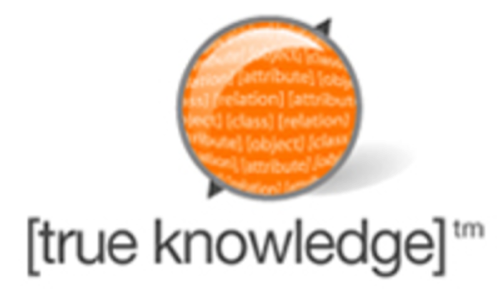
One year later, TrueKnowledge is still in private beta – and this author got an error message when I submitted my email to apply to get into the beta. However there are signs of public life in the company blog, which is fairly active. Also the company launched a beta app this month, called Quiz Bot – a natural language search service that likely “won’t be able to answer your question, but by asking us you are helping improve the service.”
RWW verdict one year later: The jury is still out. It looks like a public beta is still some way off, which puts pressure on it to be extremely good when it eventually does launch.
Talis
Talis is a 40-year old UK software company which has created a semantic web application platform. Over the past year, Talis has continued to make a name for itself as an evangelist for the Semantic Web, most notably through the blogging and podcasting activities of Paul Miller. Talis also produces a great magazine for Semantic Web, called Nodalities, and has an active company blog under the same name. As for the company’s products, the platform seems to be iterating nicely and is being used in niche library and government applications.
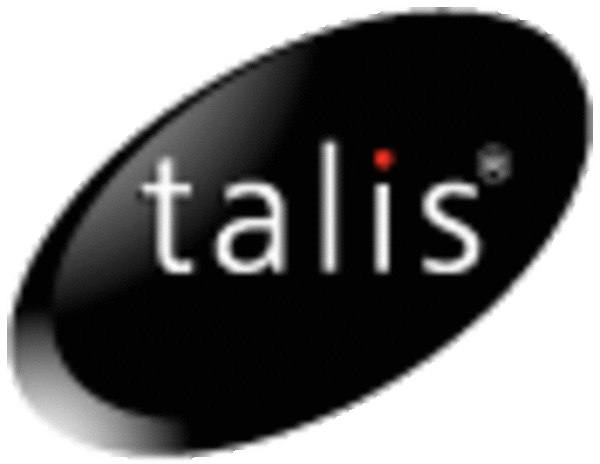
RWW verdict one year later: Talis has successfully positioned itself as an authority on Semantic Web in the blogosphere, which we love because it’s a great way to keep track of Semantic Web trends!
Spock
Spock is a people search engine that got a lot of buzz when it launched. Alex Iskold went so far as to call it “one of the best
vertical semantic search engines built so far.”

So how has it fared over the past year? Apparently its traffic has been very good. However, as Sarah Perez recently wrote on this blog, the “excitement has worn off.” Instead of searching for people on Spock or other similar people search engines, wrote Sarah, most users simply turn to old standbys like Facebook or LinkedIn. To get their mojo back again (and no doubt some money in the bank), Spock has plans to launch a new subscriber-only service in January. It will be full-on public record search tool, which people can subscribe to for $1.99 per month.
RWW verdict one year later: despite claims of great traffic growth, it’s clear that Spock as a consumer search engine hasn’t quite panned out. Can it re-invent itself as a subscription-based specialist service? Check back in another year.
Conclusion
We’re pleased to see that all 10 of the products we profiled one year ago are still very much alive and kicking. One had a great acquisition result (Powerset), at least one has grown into a thriving developer ecosystem (Calais), some are experimenting with new services (AdaptiveBlue, Spock, Hakia), some are continuing to pump out new features and/or apps (TripIt, Talis). However, it’s also clear that some are still trying to find their feet (Freebase, Twine, TrueKnowledge).
In our next post in this series, we’ll profile 10 more Semantic Apps to watch! Please tell us in the comments which ones have caught your eye recently.

















